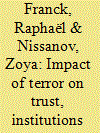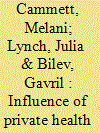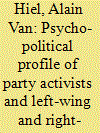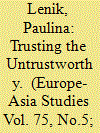| Srl | Item |
| 1 |
ID:
175471


|
|
|
|
|
| Summary/Abstract |
This article takes advantage of the timing in the implementation of the European Social Survey (ESS) in Israel to assess the impact of political violence on individual attitudes towards trust, institutions and redistribution. The results suggest that a terror attack occurring on the day of an interview positively and significantly improves individual views on interpersonal trust but does not modify views on political and legal institutions. Furthermore, rocket attacks make respondents more likely to support redistribution policies, and unlike terror attacks, have a persistent impact on individual attitudes.
|
|
|
|
|
|
|
|
|
|
|
|
|
|
|
|
| 2 |
ID:
142733


|
|
|
|
|
| Summary/Abstract |
Using individual-level data from the 2008 European Social Survey and country-level health care financing data we analyze the influence of private financing of health care on political trust in twenty-five European countries. Net of known predictors of trust at the individual and country level, we find that trust in government is significantly lower where the health system is financed to a greater degree by private sources. This negative relationship occurs because in countries with more private financing, low-income citizens perceive themselves to be at greater risk for not receiving needed health care. This perception of risk is associated with more negative evaluations of the performance of the health care system, which in turn is associated with less trust in government. When states do less to ensure the basic health care needs of members of society who are at greatest risk, these citizens may come to place less trust in government institutions. Hence, the increasing pressure on European governments to privatize the financing of health care in the wake of the financial crisis that is also characterized by growing income inequality threatens to make citizens trust government less. At the same time, implementation of the Affordable Care Act could signal a renaissance for political trust in the United States, if a growing role in the health care system is accompanied by a redistribution of risk.
|
|
|
|
|
|
|
|
|
|
|
|
|
|
|
|
| 3 |
ID:
111504


|
|
|
|
|
| Publication |
2012.
|
| Summary/Abstract |
Previous studies comparing ideological groups have been restricted to tests of between-group differences in the means of relevant political psychological variables, thereby neglecting group differences in the variances, meanings and nomological networks of the tested variables. A first exploratory study used data from the European Social Survey (N = 7,314) comparing groups of political party members on the basis of their scores on a self-placement left-right scale. The second study (N = 69) constituted an in-depth test for the presence of differences between samples of political activists of moderate parties, communists, anarchists and right-wing extremists. The results revealed that there is a fair amount of heterogeneity within left-wing and right-wing extremists, indicating a substantial amount of within-group variance of social attitudes, values and prejudice. Moreover, the extremist ideologies are best approached as distinct ideologies that cannot be reduced to extreme versions of moderate ideology, and differences in the meanings and nomological networks of the various extremist ideologies were also obtained. It is erroneous to consider members of extremist groups as being 'all alike'. The findings obtained from samples of political moderates are not a particularly solid basis for theories about extremism.
|
|
|
|
|
|
|
|
|
|
|
|
|
|
|
|
| 4 |
ID:
191758


|
|
|
|
|
| Summary/Abstract |
The study explores attitudinal change in political trust, social trust and satisfaction with the Polish government over the years 2012–2016 using European Social Survey (ESS) data. To trace the attitudinal change, I used a probit model (contemporary measure) instrumenting political trust and satisfaction with governance as two endogenous regressors and created lags corresponding to years before and after the Law and Justice Party came to power. The key finding of the study is that voters dissatisfied with the government before the 2015 election campaign voted for the populist party, while the contemporary measure identified individuals with a higher degree of political trust and those sceptical towards their immediate social circle as supportive of the populist incumbent.
|
|
|
|
|
|
|
|
|
|
|
|
|
|
|
|